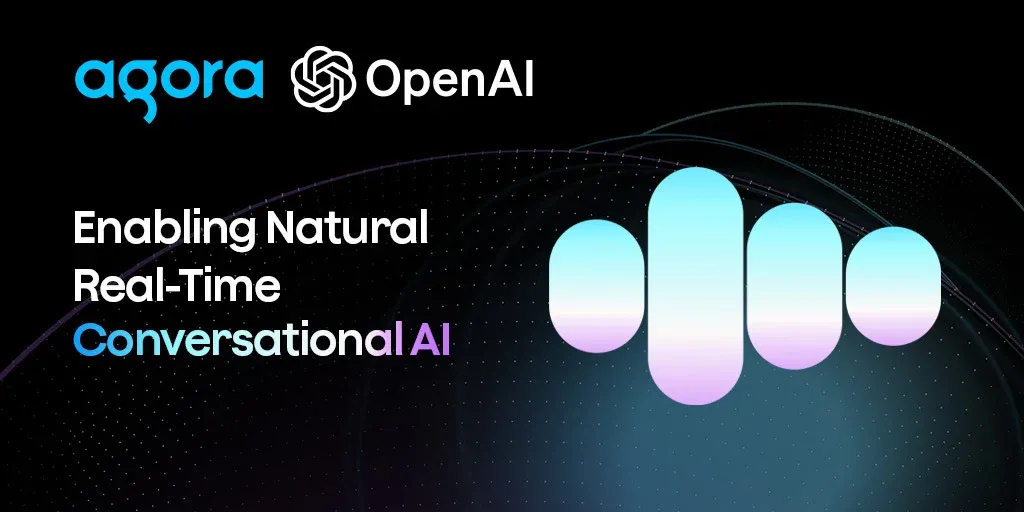Agora integrates OpenAI to power voice-driven AI for apps everywhere
From customer support to education, Agora and OpenAI team up to make AI-powered voice interaction accessible.

Agora, a platform for real-time communication APIs, has launched a Conversational AI SDK that works with OpenAI’s Realtime API. This integration makes it simple for developers to add natural, voice-driven AI features to their applications.
With this SDK, Agora aims to make it easier to create AI tools that feel intuitive and human-like, opening up opportunities in industries such as customer support, education, gaming, and more.
Agora provides developers with APIs to embed real-time voice, video, and interactive streaming capabilities into their apps, supporting billions of minutes of engagement every month across 200+ countries. OpenAI is a leading AI research organization and technology provider, known for its advanced language models like GPT, which power a wide range of applications in natural language understanding and generation.
Tony Zhao, CEO and co-founder of Agora, explained the significance of the launch, “Real-time conversational AI is helping people and organizations get more from technology. With OpenAI, our Conversational AI SDK will help developers create more interactive apps by combining natural voice interaction with OpenAI’s advanced AI and Agora’s real-time audio capabilities.”

The SDK connects Agora’s low-latency real-time audio technology with OpenAI’s conversational models to enable responsive, lifelike voice interactions. It also includes features like echo cancellation and background noise reduction to ensure reliable communication in any setting.
Expanding possibilities for developers
Agora’s Conversational AI SDK supports a wide variety of use cases, including:
- Customer support: AI agents providing round-the-clock assistance.
- Healthcare and wellness: Personalized coaching and interactive guidance.
- Education: Language learning tools and conversational tutors.
- Smart devices: Voice-driven interactions for IoT products.
Samuel Lim, CEO of Grepp, a South Korean company specializing in IT training and assessment services, shared how this technology enhances learning platforms, “By integrating interactive AI learning assistants, we can improve skill assessment and offer better support to developers, while reaching a broader audience.”
Yun Zhang, CEO of Wyze, a Seattle-based company specializing in affordable smart home products, also noted how Agora’s real-time network improves smart devices, “Agora’s low-latency technology ensures that voice interaction with our AI-powered devices feels natural and seamless.”
Agora and OpenAI’s collaboration is expected to drive innovation by helping developers create applications that were once too complex or resource-intensive to build.
“This SDK will make it easier for developers to design tools for education, customer service, and many other areas. It also helps people use AI in ways that fit their daily lives.”, Tony highlights.
Developers interested in building voice-driven applications can find more information about Agora’s Conversational AI SDK here.
Implications for marketers
The integration of Agora’s Conversational AI SDK with OpenAI’s Realtime API opens up significant opportunities for marketers looking to enhance user engagement and personalization.
With voice-driven AI, businesses can offer more interactive and dynamic customer experiences, such as personalized recommendations, real-time Q&A, and on-demand assistance. These capabilities allow marketers to engage customers at a deeper level, building trust and loyalty by providing immediate, context-aware responses that feel natural and human.
Additionally, voice-driven AI can play a key role in automating repetitive tasks, such as answering FAQs or collecting feedback, freeing up time for marketing teams to focus on strategic initiatives.
Marketers can also use AI insights gathered through conversational interactions to refine their campaigns, segment their audience more effectively, and deliver tailored content. Whether through customer support chatbots, interactive ads, or voice-enabled apps, the potential to integrate conversational AI into marketing strategies is vast, offering brands a chance to stand out in increasingly competitive markets.
AI tools marketers can utilize to up their game
Here are three tools that marketers can use to harness AI insights from conversational interactions and improve their strategies:
1. HubSpot with AI Chatbots
HubSpot’s Marketing Hub includes AI-powered chatbots that enable seamless customer interactions. These bots collect valuable customer insights, such as preferences and behavior patterns, which marketers can use to segment audiences and personalize campaigns. HubSpot also integrates with tools like OpenAI to create even more dynamic, conversational experiences.
2. Salesloft
Salesloft is a conversational marketing platform that specializes in AI-driven chat and email automation. Marketers can use Drift to engage website visitors in real time, gather feedback, and guide them through the sales funnel. The platform’s AI-driven insights help marketers refine messaging and target the right audience segments for tailored outreach.
3. Qualtrics XM Discover
Qualtrics XM Discover leverages AI to analyze customer interactions across channels, including voice, chat, and email. Marketers can use this tool to identify trends, measure sentiment, and gain actionable insights from conversations. These insights enable more effective audience segmentation and campaign optimization, leading to better customer engagement and retention.
Each of these tools can empower marketers to leverage conversational AI, streamline workflows, and deliver highly personalized experiences that resonate with their audience.
This post is created by ContentGrow, providing scalable and tailored content creation services for B2B brands and publishers worldwide. Book a discovery call to learn more.




